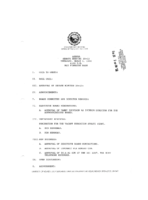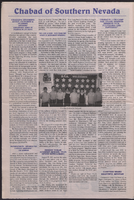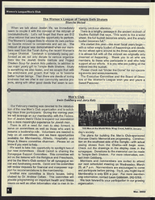Search the Special Collections and Archives Portal
Search Results
Rancho High School Class of 1962 Collection
Identifier
Abstract
The Rancho High School Class of 1962 Collection (1956-2017) consists of materials donated by students of Rancho High School in Las Vegas, Nevada. The collection contains school event clippings, newspaper clippings, scrapbooks, pamphlets, physical and digital photographs, and school jackets and sweaters. Additionally, the collection chronicles the lives of many students after graduation through school reunion documentation from the 1970s to 2017. The collection also includes planning files for class reunion celebrations including the 40th, 50th, and 55th reunions.
Archival Collection
Corbin Harney Nevada Test Site Protest Photograph Albums
Identifier
Abstract
The Corbin Harney Nevada Test Site Protest Photograph Albums (1995-1997) are comprised of three photograph albums documenting the life and spiritual, environmental, and political activism work of Corbin Harney, elder and spiritual leader of the Newe ("the People") Western Shoshoni Indians. The majority of the photographs are focused on the anti-nuclear protest demonstrations by the Shundahai Network at the Nevada Test Site during the 1990s.
Archival Collection
Southern Nevada Historical Society Records
Identifier
Abstract
The Southern Nevada Historical Society Records document the management and development of the Southern Nevada Historical Society (SNHS) as well as various historical projects in Las Vegas and Southern Nevada that the society sponsored from 1948 to 1983. The records include SNHS correspondence (1951-1978), meeting minutes (1958-1983), and accounting information (1959-1980). It also contains copies of the SNHS Backtrails Newsletter, promotional material for events, membership lists, and research materials for various projects related to the history of southern Nevada and Las Vegas.
Archival Collection

Kim You Taing oral history interview: transcript
Date
Archival Collection
Description
Oral history interview with Kim You Taing conducted by Vanessa Concepcion, Cecilia Winchell, and Stefani Evans on November 15, 2021 for Reflections: The Las Vegas Asian American and Pacific Islander Oral History Project. Kim discusses his upbringing in Cambodia during the Cambodian Civil War, the death of his siblings from tragedy and his father from racially-motivated war crimes, and his immigration to the United States as a refugee. He shares how he and his mother lived and worked in the United States, first in Seattle, Washington and then in Las Vegas, Nevada. Kim talks about his work in the hospitality industry in various Vegas hotels and casinos and his membership with the Culinary Workers Union advocating for Asian workers. He also discusses family life with his wife and daughter and his plans to retire.
Text

Emilia Marquez oral history interview: transcript
Date
Archival Collection
Description
Oral history interview with Emilia Marquez conducted by Maribel Estrada Calderón on July 5, 2019 for the Latinx Voices of Southern Nevada Oral History Project. Claytee D. White and Emily Lucile are also present during the interview. Emilia Marquez was born in the United Stated and raised in Alexandria, Virginia, where her father worked as a bricklayer, until the age of twelve, when her father decided to move the family back to Uruguay. She describes acclimating to her new life in middle school and her shift from being perceived as an outsider in Uruguay to accepting Uruguay as home. She describes life in Uruguay and the positions that her family held while living there. After meeting and marrying her husband they trained to work in a casino. She trained as a slot machine operator, and her husband trained as a dealer. This eventually led them to leave Uruguay for the U.S. After the encouragement of her father and mother, she moved with her mother to Las Vegas to work in the casino industry. She describes working as a change person at the Luxor before moving to the newly opened Palms, where she worked until she left it to work at the Wynn. She ends the interview talking about various Uruguayan dishes and traditions, and a brief history of Uruguay. Subjects discussed in this interview: Uruguay, immigration, Las Vegas Strip, Latinx, Luxor.
Text
Claudine Williams Photograph Collection
Identifier
Abstract
The Claudine Williams Photograph Collection (approximately 2007-2009) consists of nine optical disks containing ninety-eight digital surrogate images dating between 1940 and 2000. The images primarily portray Claudine Williams in publicity images for various hotel and casinos Williams and her husband owned alongside prominent individuals, including Dean Martin, Hillary and Bill Clinton, and Robert Reich. Other images depict Williams in her youth and with her family members. Additional materials include images of Williams’ business cards, articles in various Las Vegas and Nevada magazines and newspapers on Williams, and images of properties Williams operated.
Archival Collection

Meeting minutes for Consolidated Student Senate University of Nevada, Las Vegas, March 1, 1990
Date
Archival Collection
Description
Text

Jessica Hutchings oral history interview: transcript
Date
Archival Collection
Description
Oral history interview with Jessica Hutchings conducted by Barbara Tabach on March 21, 2018 for the Remembering 1 October Oral History Project. In this interview, Jessica Hutchings discusses her experience flying to Las Vegas, Nevada on the night of the October 1, 2017 mass shooting. She speaks of her flight's detour to Phoenix, Arizona, and her discovery of the shooting. Hutchings explains how Congregation Ner Tamid, where she is a cantor, contributed to the community healing after the tragedy, including their organization of vigils, a music fundraiser called "Vegas Strong in Song," and discussing the event with teenage Hebrew School students who had questions and concerns about the shooting.
Text


